
I didn’t go into 1977 thinking this was going to be an auspicious year or for that matter anybody’s “year.” How could I have done? I was about to become thirteen and at school I was brilliant in about six subjects, quite good in three others, mediocre in two and completely useless in one. My peers were of course brilliant in all subjects because they had the upbringing and confidence that I hadn’t.
After school we’d rehearse The Chinese Mask over and over again. It really wasn’t much of anything – a twenty-minute play for children with a very straightforward and linear plot. My suggestion of staging Isaac Asimov’s 1941 short story Nightfall – I wrote a playscript with stage directions, lighting instructions and everything and it still exists – fell on ears that were more mocking than deaf. But it was fun doing The Chinese Mask and we enjoyed rehearsing it. The social side of things was essential.
Musically I was more confident about making my own choices and I’d begin to spend my relatively generous weekly pocket money on Saturday daytime excursions to the record shops of Glasgow and, when I needed to, Hamilton (Impulse Records was a great shop; they sold the first Ramones album on import for £4.79 because the Lord Provost had banned it from being sold in Glasgow due to “Now I Wanna Sniff Some Glue” and sensationalist headlines in the Evening Times) to pick up things I’d read about in Melody Maker, NME, Sounds and Record Mirror but which didn’t necessarily get played on daytime Radio 1 or Radio Clyde (261), and of course there was no internet back then, plus I was too young to stay up and listen to Peel (not that he was worth listening to; for the record he was mostly still stuck in the meaningful singer-songwriter/prog-rock anti-groove at the time, before John Walters pushed his boat out a little further). You had to go out and risk catching a cold to find out about things for yourself.
I would remark, however, that for me punk was not a Year Zero. If anything it helped open my musical floodgates by a degree. I was still a pluralist; Show Some Emotion was as important to me as Spiral Scratch and do you know what, it still is. I couldn’t abide tribalism at the time because that’s what everybody else at school did and it was boring. I haven’t modified those views. Oh, and in actual 1977 Trans-Europe Express was considered progressive rock; Derek Jewell played it. In fact that was where I first heard Kraftwerk, in early December 1974 when DJ DJ spun an excerpt from Autobahn, interspersed by music from the Welsh rock group Man, Gary Boyle’s jazz-rock band Isotope, the Oscar Peterson Trio and Singers Unlimited on his Radio 3 show Sounds Interesting. My father taped that. Proper eclecticism. Old Derek wasn’t nearly so keen on punk but that would have been like expecting Alec Guinness to rave over Kool Herc, of whom nobody outside the Bronx had heard in 1977.
Anyway, the charts of 1977 comprised a rather dizzying mixture of the new, the unexpected and the sheerly dire and I thoroughly enjoyed typing out each week’s Top 50 on my lovely new Smith-Corona typewriter, which I still miss. It was an exciting time to be alive, active and receptive, to use three mock-adjectives nobody used at the time. In some ways I was relieved to be too young to go to gigs, hence avoiding all the oi-oi-beer bottle nonsense one reads about in histories, but also old enough to…get the music, which for the 1977 me was enough.
Oh, and two reviews of the new David Bowie album appeared, side by side, in the NME week ending 22 January 1977, coinciding with my thirteenth birthday. One of them made me want to become a music writer.
Notes on Text
The Evita/Kaleidoscope Of Rainbows juxtaposition is in tribute to Barbara Thompson, who performed on both albums.
The Elvis comment was written when he actually was still alive and stands. "Suspicion" then Bootsy because somebody been messin' with the King's funk.
8 January (there was no new chart for 1 January)
LIVERPOOL EXPRESS: Every Man Must Have A Dream/Call Me Your Love (Warner Bros K 16854)

A dramatic beginning to a new year from a group seemingly mired in an identity crisis. Last time they were trying to be 10cc, while now they offer a sturdily pompous orchestral ballad that Gerry and the Pacemakers might have recorded in 1965. It’s actually really well put together but the vision I get is one of a ship sailing from the Mersey docks for the final occasion before they close the shipyards down. This is a rather old-fashioned record, steadily drifting out of date.
ROSE ROYCE: Car Wash/Water (MCA 267)

Whereas this sounds like something exciting and new. Good to see Norman Whitfield emerging from the other end of the Temptations’ dead end tunnel with an irreverent, good-natured clapalong uptempo boogie, complete with a terrific lead vocal (one Gwen Dickey, as I understand things) and Radio Clyde jingle strings, though nowhere near as bothersome as the one imposed on the Rollers last autumn. Somebody’s opened the window and allowed spring to stream into the living room early.
JULIE COVINGTON: Don’t Cry For Me Argentina/Rainbow High (MCA 260)
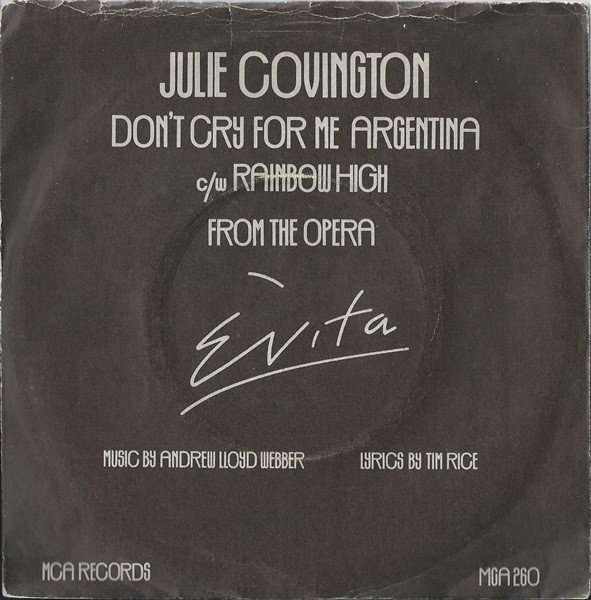
This might well be 1977’s oddest hit, from the Lloyd Webber/Tim Rice musical Evita. Normally songs from rock musicals don’t get very high in the charts because they tend to lurk in the neighbourhood of pop rather than inhabiting pop itself. They’re on nodding terms with pop but not really ready to embrace it.
But this really is a strange record. It’s sort of an operatic aria, except Julie Covington sings it as though she’s in a folk club with an audience of five. Barbara Dickson could have done this (I think she has her own song in Evita but I haven’t heard the full double album yet. My mother wants to get it, though). My father is a bit more cynical, saying that Lloyd Webber needs to pay Aaron Copland for borrowing from Streets Of Laredo. We both hear an element of Stravinsky’s Rite Of Spring in the arrangement as well.
This is a profoundly sad song which seeks to disguise its sadness beneath the pancaked make-up of rhetorical bombast. She’s President of Argentina, or at least the President’s wife…but she doesn’t sound overjoyed by the victory. And she declares all these pledges and apologises all the time for doing so until it dawns on the listener – she isn’t actually saying anything. It’s all deliberate clichés, like Peter Sellers’ “Party Political Speech.” Therefore it is difficult to know on whose side we should be when the song reaches its climax.
Mysterious, hard to grasp immediately and bearing the reluctant aura of a hopeful epic standing in a corner whispering to itself. Records like this either sell nothing at all or sell a million. It will be intriguing to see where this one ends up. I find it rather admirable.
JOHN CHRISTIE: Here’s To Love (Auld Lang Syne)/Old Enough To Know Better (EMI 2554)

Glutinously sentimental New Year singalong ballad crooned by a sensible pullover. If EMI think he’s the future rather than the Sex Pistols then they’re either over-optimistic or just plain blinkered.
THE DRIFTERS: You’re More Than A Number In My Little Red Book/Do You Have To Go Now (Arista ARISTA 78)
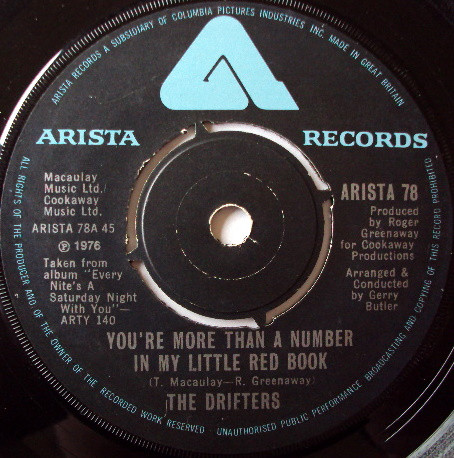
Usual boring (and, for an American soul group, very British-sounding) fare to serve as the soundtrack to jam-making competitions at your local community centre.
15 January
DONNA SUMMER: Winter Melody/Wasted (GTO GT 76)

Donna Summer has made some good and interesting records but until now has been unable to shake off the “Love To Love You Baby” one saucy hit wonder status. This is good, if slightly standard, but works better in the context of the ambitious Four Seasons Of Love album.
BREAD: Lost Without Your Love/Change Of Heart (Elektra K 12241)
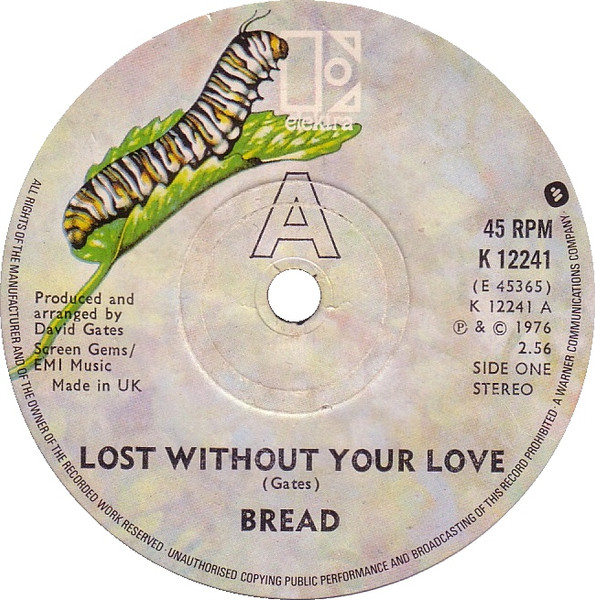
David Gates and his chums reform – and sound exactly as they did in 1970. You have to award them points for consistency, if nothing else.
ELVIS PRESLEY: Suspicion/It’s A Long Lonely Highway (RCA Victor RCA 2768)

There’s something rather morbid about RCA giving commercial preference to old Elvis records when the man’s still alive (if, apparently, only just). Is his current output so terrible that they have to resort to pre-Beatles album tracks? You’d think he was Jim Reeves sometimes, the way they treat him.
BONEY M: Daddy Cool/No Woman No Cry (Atlantic K 10827)

Icy Germanic disco, like a gruffer Silver Convention. The Bob Marley cover on the B-side duly boggles the mind.
22 January
JESSE GREEN: Flip/Highwaves Of The Sea (EMI 2564)

Euphoric Latin-carnival pop-soul with “Runnin’ Away” trumpets, zippy strings, chattering funk guitar and Green’s highly enthusiastic vocal. Released six months too early because this would have been huge in the summer. Very enjoyable.
PUSSYCAT: Smile/What Did They Do To The People (Sonet SON 2096)

Very dated-sounding (New Seekers-style) and unexciting number one soundalike follow-up. The B-side is, bafflingly, an uptempo country-rock trot featuring a heavily-accented male lead vocal!
EAGLES: New Kid In Town/Victim Of Love (Asylum K 13069)
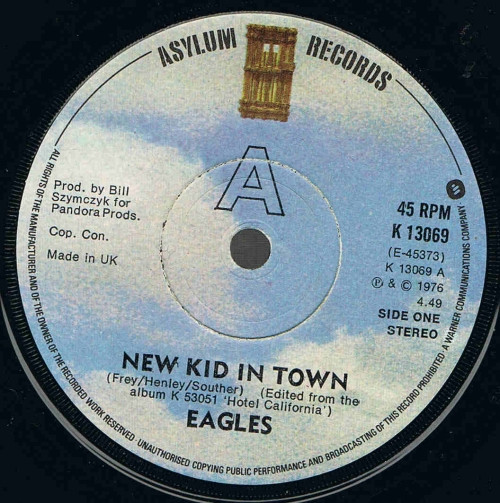
Formulaic polite country-pop-rock fare.
THIN LIZZY: Don’t Believe A Word/Old Flame (Vertigo LIZZY 001)
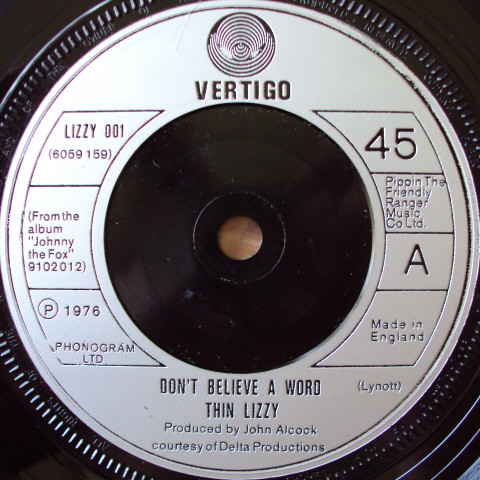
Punks seem to tip their hat, or their safety pins anyway, to Thin Lizzy because unlike so many other rock bands I could name their credibility is intact and they still actually rock. This is a thunderous pop-rocker even by Phil Lynott’s standards and it sounds as though the band has been absorbing some of the punk things. Superb and deserves to be as big a hit (although I’m not completely sure it will be) as “The Boys Are Back In Town.”
DAVID PARTON: Isn’t She Lovely/Love And Peace Of Mind (Pye 7N 45663)

Reading 20 Years Of British Record Charts, you realise there was quite a lot of this sort of thing going on in the fifties in particular (and indeed well into the sixties); quickfire cover versions of big American songs by British singers, “Only Sixteen” by Craig Douglas rather than Sam Cooke. I suppose Stevie Wonder was never going to edit down the eight-minute original of “Isn’t She Lovely” – and why should he; it’s the man’s benign yet adamant refusal to edit anything that is one of the many factors that make him so special – but the song deserves better than this glum and parochial Woolworths cover with a nauseating soprano saxophone (which instrument, as I’ve said before, my father HATES) replacing Stevie’s harmonica. It is obviously going to be a huge hit here because there is literally nowhere else for the undiscerning record buyer to turn to. It’s like being given a packet of Fine Fare own brand cornflakes when you asked for the Kellogg’s original.
29 January
HEATWAVE: Boogie Nights/All You Do Is Dial (GTO GT 77)

Well – what to say about this dazzlingly glorious pop record? It’s disco, yes, but ingeniously so; at times it’s almost reluctant to reveal itself as a disco record, beginning with mystical swirls of harp and jazz drumming (which my father says reminds him of Alice Coltrane; I’ll have to take his word on that) before launching into this immense and multi-dimensional groove with interweaving vocal counterpoints and an increasingly despairing-sounding refrain of “Got to keep on dancin’/Keep on DANCIN’!” like the contestants in They Shoot Horses, Don’t They? who are forced to remain on the floor until they literally drop. It’s as if this happiness comes at a price, and the song fades as mysteriously as it began. Produced by Barry Blue, arranged by John Cameron and composed by the band’s keyboard player Rod Temperton. I wonder if this is a more accurate portrait of the future of pop than “Anarchy In The U.K.” This is going to be BIG.
GARY GLITTER: It Takes All Night Long (Part I)/It Takes All Night Long (Part II) (Arista ARISTA 85)

I thought he’d retired a year ago, but here he comes back with a whispery disco-ish thing that sounds rather like David Dundas but this time it’s “Jeans Off.” Unconvincing and somewhat lewd.
MOMENTS: Jack In The Box/Love On A Two-Way Street (All Platinum 6146 318)

I’d forgotten about All Platinum – such a great start, such a disappointing outcome. The A-side here is dreary, lame pop-soul as though “Rock Your Baby” were still a new trend, but the B-side is a magnificent soul ballad and in any sane world (i.e. anywhere except Britain) the single would have been flipped.
HAROLD MELVIN & THE BLUENOTES (FEATURING TEDDY PENDERGRASS): Don’t Leave Me This Way/To Be Free To Be Who We Are (Philadelphia International PIR 4909)

Whereas the Philly Sound keeps delivering when you least expect it; this is a dynamic, near-operatic soul stomper with an electrifying Teddy Pendergrass lead vocal and the MFSB band at their absolute tightest. This could well become the group’s biggest hit, and deserves to do so.
LEO SAYER: When I Need You/I Think We Fell In Love Too Fast (Chrysalis CHS 2127)
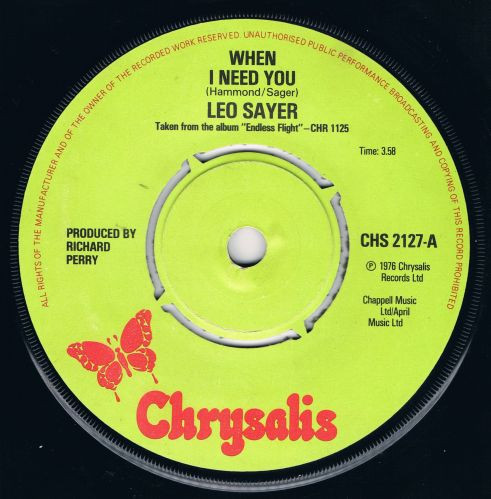
Leo could be forgiven for thinking: what do I have to do? Three number two hits in the UK, always the best man, never the groom, as they (or some might) say. Well, this could be the one to break the curse; a superb and beautifully-arranged and produced ballad sung with real, palpable conviction. I cannot see this one not going all the way to the top. Better late than never!
